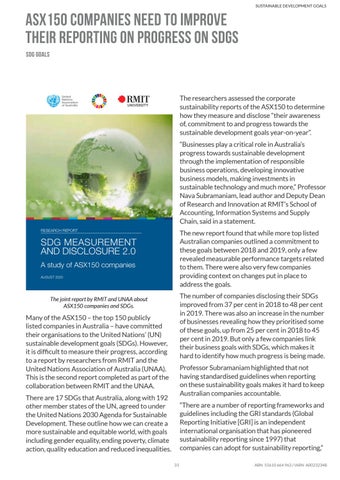SUSTAINABLE DEVELOPMENT GOALS
ASX150 companies need to improve their reporting on progress on SDGs SDG Goals
The researchers assessed the corporate sustainability reports of the ASX150 to determine how they measure and disclose “their awareness of, commitment to and progress towards the sustainable development goals year-on-year”. “Businesses play a critical role in Australia’s progress towards sustainable development through the implementation of responsible business operations, developing innovative business models, making investments in sustainable technology and much more,” Professor Nava Subramaniam, lead author and Deputy Dean of Research and Innovation at RMIT’s School of Accounting, Information Systems and Supply Chain, said in a statement. The new report found that while more top listed Australian companies outlined a commitment to these goals between 2018 and 2019, only a few revealed measurable performance targets related to them. There were also very few companies providing context on changes put in place to address the goals. The number of companies disclosing their SDGs improved from 37 per cent in 2018 to 48 per cent in 2019. There was also an increase in the number of businesses revealing how they prioritised some of these goals, up from 25 per cent in 2018 to 45 per cent in 2019. But only a few companies link their business goals with SDGs, which makes it hard to identify how much progress is being made.
The joint report by RMIT and UNAA about ASX150 companies and SDGs.
Many of the ASX150 – the top 150 publicly listed companies in Australia – have committed their organisations to the United Nations’ (UN) sustainable development goals (SDGs). However, it is difficult to measure their progress, according to a report by researchers from RMIT and the United Nations Association of Australia (UNAA). This is the second report completed as part of the collaboration between RMIT and the UNAA.
Professor Subramaniam highlighted that not having standardised guidelines when reporting on these sustainability goals makes it hard to keep Australian companies accountable.
There are 17 SDGs that Australia, along with 192 other member states of the UN, agreed to under the United Nations 2030 Agenda for Sustainable Development. These outline how we can create a more sustainable and equitable world, with goals including gender equality, ending poverty, climate action, quality education and reduced inequalities.
“There are a number of reporting frameworks and guidelines including the GRI standards (Global Reporting Initiative [GRI] is an independent international organisation that has pioneered sustainability reporting since 1997) that companies can adopt for sustainability reporting,” 33
ABN 55610 664 963 / IARN A0023234B














